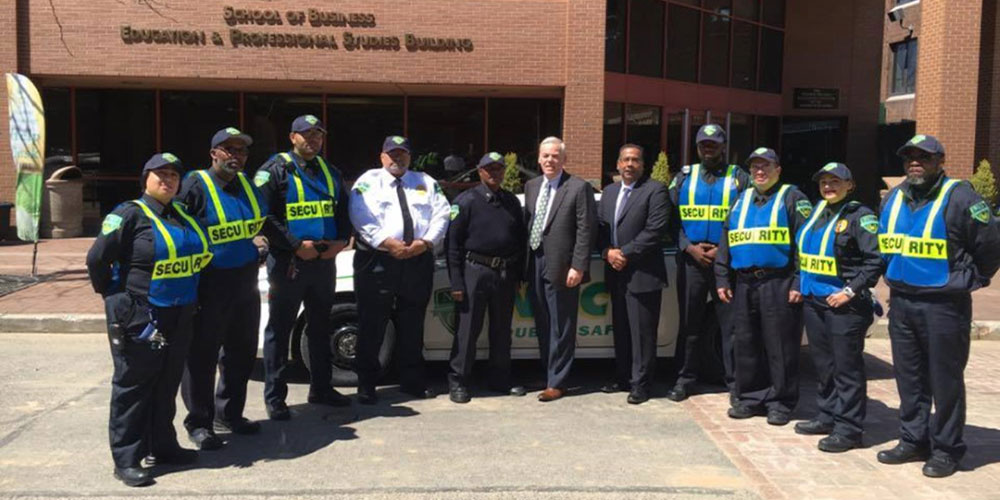NJCU Public Safety Makes Presence Known Through Student Engagement
CS Higher Education Director of the Year Ronald Hurley has taken to social media to improve communication between the public safety department and students.

Congratulations to NJCU's Ronald Hurley (center), who is one of this year's Director of the Year winners in the higher education category.
HURLEY’S ACCOMPLISHMENTS BY THE NUMBERS
- A newly-purchased three-wheeled Segway has increased patrol areas by 50%.
- DPS collaborated with fleet operations to identify and purchase two new electric patrol vehicles, making 50% of the department’s fleet “green.”
- Electric vehicle charging stations were also installed, landing NJCU as one of six employers in New Jersey with a recognition award in environmental excellence.
- Staff situational awareness has improved 27% through active shooting training.
- Approximately 35% of faculty and staff have successfully completed ALICE online training.
- Installed thumb turn hardware on 80% of classrooms and offices.
- Upgraded and increased security cameras to now include more than 300 cameras on campus.
CAMPUS SECURITY IMPROVEMENTS
- Introduced Rave Guardian app to strengthen communication by allowing students and faculty to activate a virtual safety escort timer, send tips to the dispatch command center and contact the department of public safety.
- Introduced Rave Alert, a campus-wide mass notification system which allows the dispatch center to send immediate audible-visual messages and instructions to the NJCU community on their desktop computers, cell phones, public address system and text-to-speech fire alarm system.
- Changed dispatch communication system from analog to digital and consolidated all radio communications (i.e. DPS, shuttle bus, facility) without additional cost for separate frequency base hardware.
- Implemented key tracking technology to safeguard campus security master keys, avoiding the cost of rekeying locks.
- Upgraded the dispatch center phone and radio communications recording system.
- Introduced a new camera management system, which manages and maintains the CCTV system to ensure there is no downtime or outages.
- Upgraded and replaced all outdated security systems on DPS computers.
EMERGENCY PREPAREDNESS IMPROVEMENTS
- Partnered with the office of emergency management and Mutualink to allow local law enforcement to monitor and operate campus communications and CCTV systems during a crisis.
- Established a collaborative relationship with the City of Jersey City police and fire departments.
- Restructured the emergency response team to form and co-chair a new university crisis leadership team — a smaller, more effective group leading the university through a crisis.
- Conducted campus-wide risk assessments, identifying and mitigating significant security and safety risks.
- Co-founded the safety, security and sustainability committee with member representatives across the university to engage in security and safety discussions.
- Created a classroom emergency response guide that explains what specific actions should be taken in each emergency, including fires, bomb threats, power outages and lockdowns.
- Updated and posted evacuation plans in all offices and classrooms.
If you appreciated this article and want to receive more valuable industry content like this, click here to sign up for our FREE digital newsletters!
 Leading in Turbulent Times: Effective Campus Public Safety Leadership for the 21st Century
Leading in Turbulent Times: Effective Campus Public Safety Leadership for the 21st Century
This new webcast will discuss how campus public safety leaders can effectively incorporate Clery Act, Title IX, customer service, “helicopter” parents, emergency notification, town-gown relationships, brand management, Greek Life, student recruitment, faculty, and more into their roles and develop the necessary skills to successfully lead their departments. Register today to attend this free webcast!








